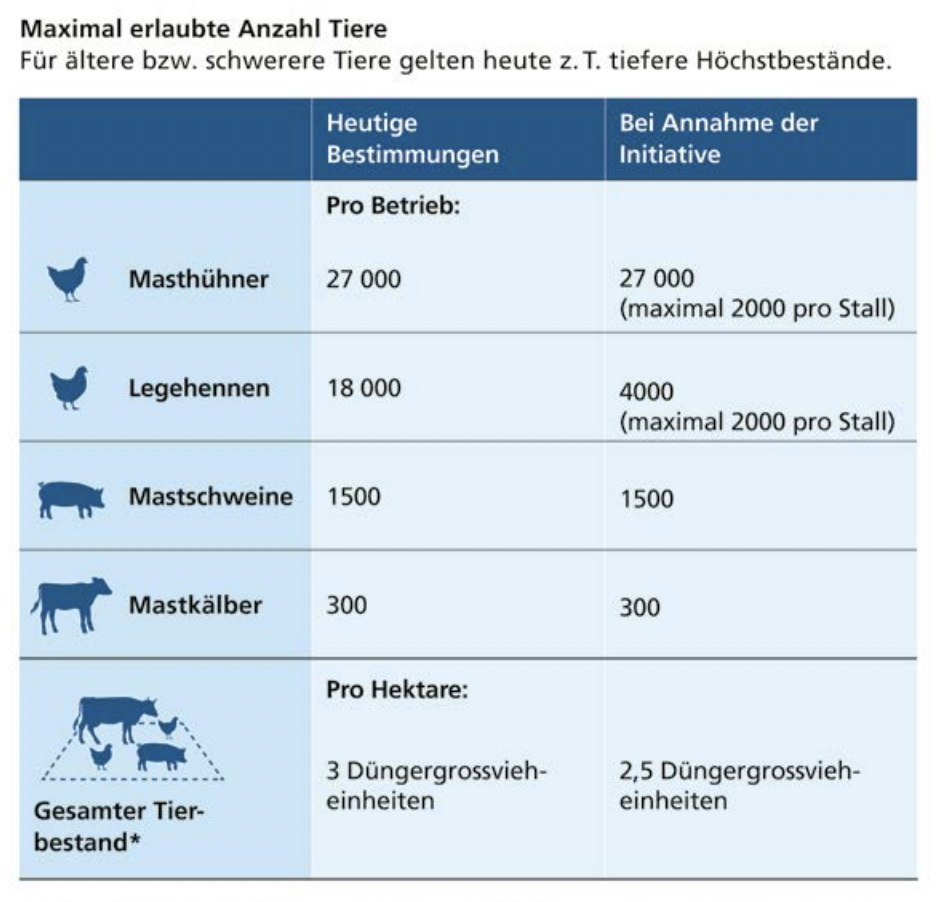Today, the Swiss electorate could have voted for the abolition of factory farming (25 years from now [1]). But, in aggregate, we did not. By a depressingly large margin. The participation (as share of the electorate) was 52.3%, of which 37.1% voted in favour of the initiative. Securing, on top of the voter majority, the cantonal majority, which would have also been required, was even further out of reach: "Canton Basel City was the only of the 26 regions to approve the idea." The initiative was launched by Sentience Politics. More info about the initiative and the results in this swissinfo.ch article (in English): Voters reject ethical overhaul of animal farming rules
In my impression, the most influential argument of the camp against the initiative was that factory farming just doesn't exist in Switzerland.[2] Even if it was only one of but not the most influential argument, I think this speaks volumes about both the (current) debate culture and the limits of how hopeful we should be that relevantly similar EA-inspired policies will soon see widespread implementation .
A key question is: What does relevantly similar mean here? A key argument, from a purely egoistic perspective, against abolishing factory farming is that, to some extent probably hard to precisely estimate in advance with much confidence, animal products will become more expensive. 1) Maybe many future EA-inspired policies would not have such costs, 2) arguably many future EA-inspired policies won't even (need to) be voted on by the electorate (in some cases it might even be sufficient to get a handful of key individual actors on board), and 3) probably there are other reasons why I have more reason to be hopeful about EA-inspired policies than I feel right now.
But still... Rarely in the history of Switzerland has there ever been an initiative that, from an EA perspective, has been of higher moral significance and simultaneously, from an EA perspective, of lower controversiality. The fact that the electorate of Switzerland (notably roughly the richest country in the world) failed to vote to abolish factory farming 1) is a testament to just how far we, as world optimisers, still have to go and, slightly more controversially 2) serves as a reminder that we can philosophise as much as we want: to the extent that bridging the gap from global priorities research and longtermist macrostrategy to the "real world" turns out to present even more of a challenge than we previously thought, we would better rethink our allocation of resources along what I'd roughly conceptualise as a theoretical/fundamental/"ivory tower" – practical/applied/"real world" dimension.[3]
1) Where do/might you (dis)agree with me? Am I missing an important consideration?
2) What's your reaction to the initiative and results?
3) What (tentative) lessons from this can we draw for the future pursuit of EA-inspired policies (within and beyond non-human animal welfare)?
- ^
- ^
While I admit the term factory farming is open to interpretation and that the extent to which fundamental interests of farm animals are systematically violated is lower in Switzerland than in most other countries, I encourage people who are skeptical as to the existence of factory farming in Switzerland to search for facts and videos on this topic. It may be less horrible than in most countries, but it is still horrible to be your average farm animal in Switzerland.
- ^
Which I find ironic given that research on the value of global priorities research compared to other endeavours is a key question within, well, global priorities research.


I think that 37% is a decent result when you consider the difference in budget between our camp (I recently started working for Sentience Politics) and the opposition, who also represented the status quo. For them, it was a sitter. But I'd be sitting less comfortably now.
More than 1 in 3 voters decided that they were prepared to pay a little extra to phase out the most egregious of animal husbandry practices over a period of 25 years.
Over the next 25 years, my crystal ball tells me we will see a mahoosive proliferation of alternative proteins, such that an initiative like this may well not be required anymore. So I think EAs should focus on speeding that process up prontissimo.
It won't be ethics that causes most people to change their diet, nor environmental concerns (overblown as they may sometimes be by animal advocates). It'll be the all-else-being-equal availability of a convenient alternative. Most likely grown in a lab.
As for the animals suffering in the here and now, and where to go in the aftermath of the initiative, I think it would make sense to look at which of the demands garnered the most support, and how to re-package them in such a way to maximise the likelihood of individual success. At the moment, it looks like consumers took the biggest issue with the small spaces that animals are forced to live in. That's a straightforward matter without much room for convolution.
Eleos, I'm not sure that your number 2 is controversial, or that it ought to be, but I am sure that I think it's spot on. Having the kind of resources that the opposition had would likely have made a difference. Perhaps all the difference. This wasn't an exercise in navel-gazing but a huge opportunity to make a, as you say, 'real world' difference under the EA banner. On a side but related note, reading most of the posts on this forum gives me a headache. I'm too thick, along with most of society. We've got to make EA ideas digestible and practicable for the common Jim.